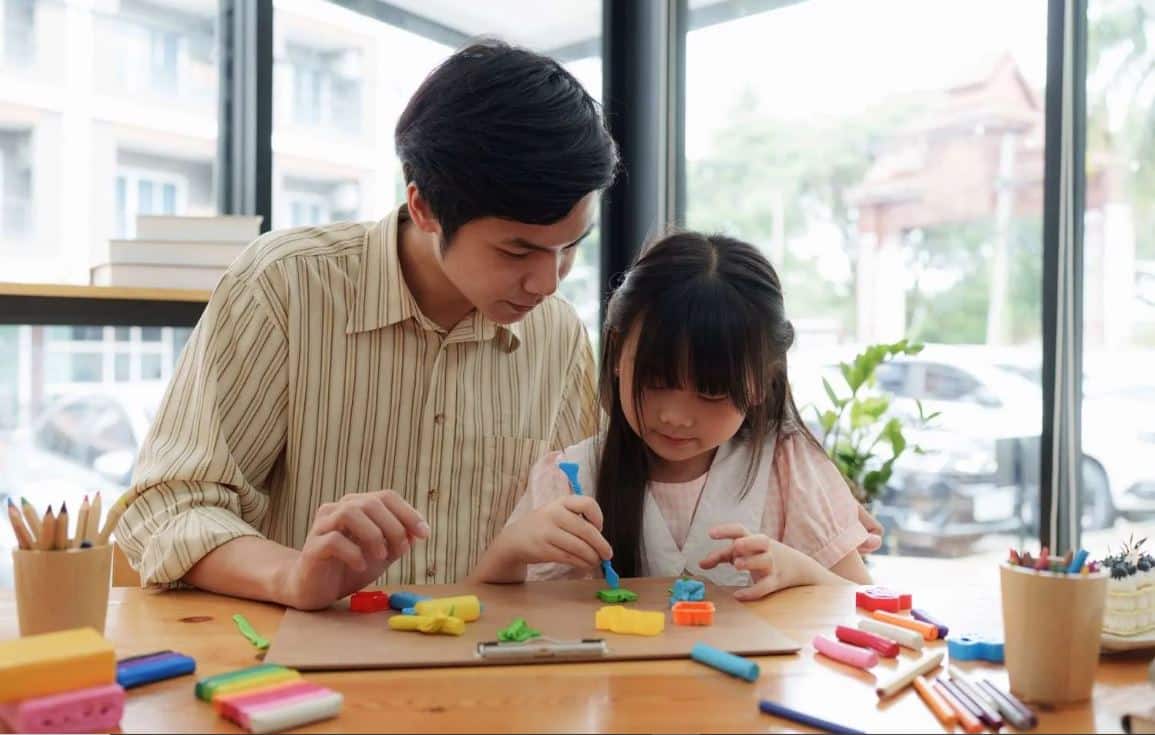For parents of children with autism, helping their child develop independence is both a primary goal and a journey filled with unique challenges and remarkable victories. ABA therapy and independence have emerged as a valuable approach that focuses on developing crucial life skills through structured, personalized support. This evidence-based method creates lasting positive change by working with each child’s unique needs and abilities while providing families with the tools and guidance they need throughout their journey.
Understanding ABA Therapy and Independence: A Foundation for Growth
Applied Behavior Analysis (ABA) therapy has consistently shown promising results in helping children with autism develop essential life skills and foster independence.
According to recent research by Da Silva et al. (2023), ABA therapy can significantly improve children’s skill performance across various domains, including daily living skills, social interaction, and self-care abilities.
With this foundation in mind, let’s explore how this journey typically unfolds for children and their families.
Success Stories
“Move Up ABA has been a lifeline for our family. Before starting therapy, our son struggled with daily routines and communication. Now, he’s more independent and even initiated a conversation with a classmate for the first time! The progress we’ve seen in just six months is truly remarkable.”
- Emily R., Silver Spring, Accountant
“As a single dad, I was overwhelmed trying to manage my child’s behavior. The Move Up ABA team not only provided amazing support for my little girl but also taught me practical strategies to use at home. Their in-home sessions fit perfectly with our busy schedule. I’m so grateful for their patience and expertise.”
- Michael T., Rockville, Middle School Teacher
“We were hesitant about starting ABA therapy, but Move Up ABA’s approach put us at ease from day one. Our twins have made incredible strides in their social skills and self-regulation. The therapists are like extended family now, and we couldn’t be happier with our decision to work with them.”
- Aisha and James L., Simpson, Police Officers
Ready to start your child's journey to success? Schedule a free consultation today! 📞 Call (410) 497-8865.
Your Child’s Journey: From Basic Skills to Independent Living
Every child’s journey to independence through ABA therapy is unique, but the path often includes these key developmental areas:
Daily Tasks and Self Care

Our ABA therapists begin by focusing on essential life skills that build self sufficiency. Through careful task analysis, we break down complex tasks into manageable steps that encourage successful completion. Starting with basics like brushing teeth and personal hygiene, we gradually progress to more advanced self care skills like preparing meals and managing daily routines.
Social Skills and Communication Development
Building strong social skills is vital for long term success. We help children with autism learn to:
Navigate social situations confidently
Practice appropriate behaviors in different settings
Develop problem solving abilities
Build meaningful connections with peers
Communicate effectively in various environments
Supporting Families Every Step of the Way
Parents and caregivers play an essential role in their child’s development. Our board certified behavior analyst professionals provide:
Guidance for encouraging children at home
Strategies for handling challenging behaviors
Techniques for fostering independence
Tools for supporting skill development in different settings
Methods for providing additional support when needed
Building Confidence Through Achievement
As children master practical skills and experience desired behaviors being reinforced, they develop:
Greater self esteem
Increased confidence in social situations
Enhanced problem solving abilities
Stronger communication skills
Better ability to handle challenges
Beyond Basic Skills
For children with autism and other developmental disabilities, we focus on:
Teaching specific skills that translate to various environments
Using evidence based interventions to ensure progress
Providing physical guidance when necessary
Implementing positive reinforcement strategies
Supporting development across all areas of life
The Path to a Brighter Future
Our experienced ABA therapists understand that developmental delays and challenges require patience and specialized support. Through evidence based strategies and consistent practice, we help guide individuals toward:
Greater independence in daily living skills
Improved ability to handle complex tasks
Enhanced social skills and communication
Better preparation for school and beyond
Increased success in various environments
To implement these developmental strategies effectively, our ABA therapists serve as skilled guides throughout your child’s journey.
The Essential Role of ABA Therapists

Our dedicated ABA therapists play a crucial role in your child’s development by:
Providing physical guidance when needed – Through gentle prompting and support, therapists help children master new motor skills and daily tasks.
Offering verbal praise and encouragement – Positive reinforcement helps build confidence and motivates continued progress.
Creating structured learning environments – Carefully designed spaces maximize learning potential and minimize distractions.
Adapting strategies to meet your child’s unique needs – Every child receives individualized attention and customized approaches.
Implementing evidence-based strategies – Using proven techniques ensures the best possible outcomes.
Monitoring and documenting progress – Regular assessment helps track development and adjust strategies as needed.
While the role of therapists is crucial, the specific methods and strategies they employ are equally important for success.
How ABA Therapy Builds Independence Skills
Building on the essential foundation laid by our ABA therapists, our board certified behavior analysts work closely with each child to develop customized programs that focus on several key areas:
Breaking Down Complex Tasks
One of the key strategies in ABA therapy is task analysis, where we break down complex tasks into manageable steps. This approach helps children understand and master various skills gradually, building confidence with each successful completion.
Research by Yu et al. (2024) shows this systematic approach leads to better skill acquisition and retention, particularly when combined with positive reinforcement.
Developing Essential Self-Care Skills
Independence starts with fundamental self-care skills such as:
Brushing teeth and personal hygiene
Getting dressed independently
Preparing simple meals and snacks
Managing daily routines
Organizing personal belongings
Basic household tasks
Fostering Social Skills and Communication
Research by Yu et al. (2024) demonstrates that ABA-based interventions show significant positive effects on socialization, communication, and expressive language skills. These improvements are crucial for:
Navigating social situations confidently
Building meaningful relationships
Expressing needs and wants effectively
Problem-solving in various environments
Participating in group activities
Understanding social cues
As we address these core skills, we also recognize the unique challenges that many children face beyond autism.
Supporting Children with Developmental Disabilities
Our program recognizes that many children face additional challenges beyond autism. Through evidence based strategies, we address:
Developmental delays
Other developmental disabilities
Complex learning needs
Sensory processing differences
Communication challenges
Behavioral concerns
Building on these foundational supports, we focus on developing lasting capabilities that serve children throughout their lives.
Practical Skills for Long-Term Success

We focus on teaching practical skills that contribute to:
Self sufficiency in daily tasks
Independence in various environments
Successful school integration
Community participation
Long-term social success
Future vocational opportunities
Central to the success of these skill-building efforts is our commitment to positive reinforcement strategies.
The Power of Positive Reinforcement
Our ABA therapists use evidence-based strategies centered around positive reinforcement to:
Encourage desired behaviors
Build self-esteem and confidence
Celebrate progress
Motivate continued learning
Support skill maintenance
Foster independence
Supporting Independence in Different Settings
We believe in helping children generalize their skills across various environments:
At home with family
In school settings
During social activities
In community spaces
At recreational events
During daily routines
While the child’s progress is our primary focus, we recognize that lasting success requires strong family involvement.
Comprehensive Family Support
Parents and families play an essential role in their child’s journey toward independence. Through our program, we provide:
Parent training and education
Home-based strategies
Ongoing support systems
Progress monitoring tools
Family counseling resources
Communication strategies
Creating Pathways to Success
Our approach focuses on:
Breaking down complex tasks
Teaching specific skills
Providing additional support
Encouraging children consistently
Celebrating small victories
Building on successes
The Role of Task Analysis in Skill Development
We use task analysis to:
Break down complex tasks
Create manageable steps
Track progress effectively
Identify areas needing support
Adjust teaching strategies
Ensure skill mastery
Evidence-Based Interventions
Our program utilizes:
Research-backed methodologies
Data-driven decision making
Proven teaching techniques
Structured learning approaches
Systematic skill building
Regular progress assessment
Supporting Daily Living Skills

We help children develop independence in:
Personal care routines
Household responsibilities
Time management
Organization skills
Safety awareness
Community navigation
Working with Move Up ABA
Our experienced team of ABA therapists understands that each child’s unique journey requires:
Individualized programming
Evidence-based interventions
Consistent support
Ongoing assessment
Family collaboration
Regular progress reviews
With all these elements working together, your child has the support needed to build a foundation for lasting independence.
Take the First Step
Your child’s journey to independence starts with understanding their unique needs and creating a supportive environment for growth. At Move Up ABA, we’re committed to helping families in Maryland navigate this journey with confidence and hope.
Ready to learn more about how ABA therapy can help your child develop essential independence skills? Contact Move Up ABA today to schedule a consultation and discover how our experienced team can support your child’s journey toward greater independence and a brighter future.





